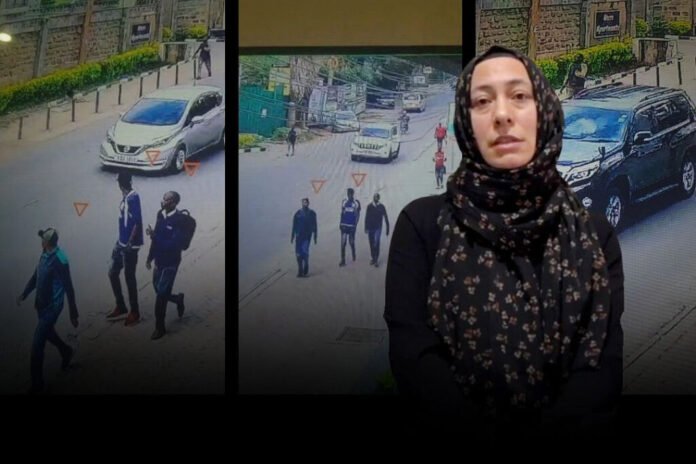Saadet Taşçı, who was kidnapped on Friday in Nairobi by individuals allegedly connected to Turkey’s National Intelligence Organization (MİT), has recounted her harrowing experience in a video message and urged authorities to locate her husband, who is still missing.
Taşçı said they were abducted from the courtyard of a government office where they had gone to get driver’s licenses. According to her account, four men in ski masks armed with AK47s forced them into a large black SUV.
Taşçı and her husband were among seven people kidnapped by unknown assailants in the Kenyan capital of Nairobi. While three of the victims, including Taşçı herself, a British citizen and a minor, were later released, four others remain missing.
“As soon as we were in the car, they blindfolded us and handcuffed my husband,” Taşçı said. “They then removed our shoes and took our phones and accessories like watches and jewelry.”
After driving for about an hour, the kidnappers then separated the couple and put them in different vehicles.
According to Taşçı, the kidnappers then drove her around town for about six-and-a-half hours while she was blindfolded. “During this time they didn’t allow me to talk, eat anything, etc.,” she added.
The couple had been granted protection by the United Nations in 2018 and issued refugee IDs. They were also issued travel documents at the beginning of 2024. “We had no doubt that the Kenyan government and the UN would protect us,” Taşçı said. “We were living here comfortable in that knowledge.”
She appealed to the Kenyan government and the United Nations to ensure the safe return of her husband and others that were abducted the same day. “The people who were kidnapped have done great services to Kenya,” Taşçı added. “Especially through their involvement in aid efforts.”
The incident has raised concerns that the kidnappers were operating under the direction of Turkish intelligence agency MİT, which is known to employ extralegal methods, including renditions, to secure the return of Gülen movement supporters abroad.
Turkish President Recep Tayyip Erdoğan has been targeting followers of the Gülen movement, inspired by US-based Turkish Muslim cleric Fethullah Gülen, since the corruption investigations of December 17-25, 2013, which implicated then-prime minister Erdoğan, his family and his inner circle.
Dismissing the investigations as a Gülenist coup and conspiracy against his government, Erdoğan designated the movement as a terrorist organization and began to target its members. He intensified the crackdown on the movement following an abortive putsch on July 15, 2016 that he accused Gülen of masterminding. Gülen and the movement strongly deny involvement in the coup attempt or any terrorist activity.
In a statement on Saturday, Amnesty International Kenya said the four missing individuals — Mustafa Genç, Hüseyin Yeşilsu, Öztürk Uzun and Alparslan Taşçı — were at grave risk of refoulement and that the incident is against both Kenyan and international law.
“Amnesty International Kenya is further concerned that they may be facing imminent forceful and unlawful return to Turkey,” the statement said. “Should this happen, they face considerable risk of serious human rights violations.”
The human rights watchdog also appealed to the government of Kenya to take immediate action to locate the missing individuals, ensure their safe return and to hold those responsible for the incident accountable.
Since the coup attempt MİT has conducted operations for the forcible return of more than 100 people with alleged links to the Gülen movement. The latest cases include Koray Vural, a Turkish businessman who went missing in Tajikistan in September 2023 and was found to be in police custody in Turkey the next month. Emsal Koç, who also went missing Tajikistan in June 2023, was found to be in police custody in the eastern Turkish province of Erzurum when the police contacted his family living in the province.
According to a 2023 report by Freedom House on transnational repression, Turkey has become the world’s second most prolific perpetrator of transnational repression. A wide range of tactics used by the Turkish government against its critics abroad include spying through diplomatic missions and pro-government diaspora organizations, denial of consular services and outright intimidation and illegal renditions.














